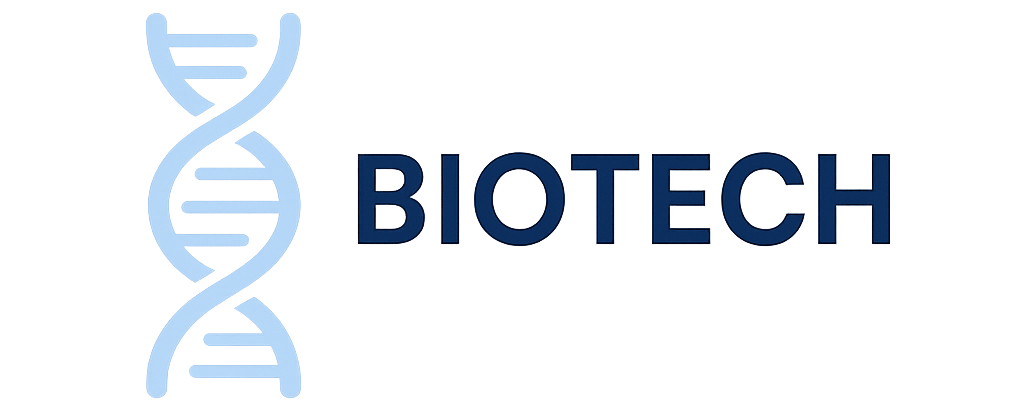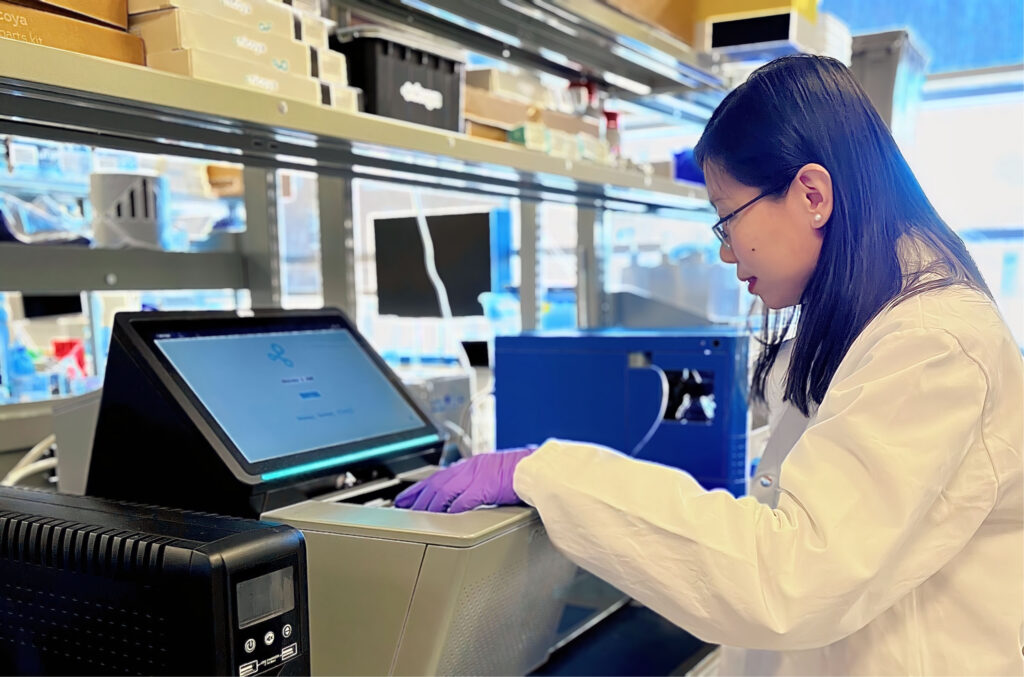
A Nicoya Lifesciences researcher works in the company’s laboratory, which opened last year within a Nest.Bio Labs shared lab space near Boston. Nicoya Lifesciences has acquired Applied Photophysics, a British-based provider of biophysical characterization instruments, for an undisclosed price, in a deal designed to bolster the buyer’s biologics characterization capabilities and accelerate Nicoya’s global expansion. [Nicoya Lifesciences]
Nicoya Lifesciences has acquired Applied Photophysics, a British-based provider of biophysical characterization instruments, for an undisclosed price, in a deal designed to bolster Nicoya’s biologics characterization capabilities and accelerate its global expansion.
By combining with Applied, Nicoya reasons, it can better serve its biopharma R&D customers through an integrated suite of technologies from a single company. Those technologies include Nicoya’s label-free interaction analysis through Surface Plasmon Resonance (SPR), and Applied’s established technologies, such as circular dichroism (CD) for analyzing protein secondary structure, and stopped-flow kinetics for monitoring rapid kinetic events and enzyme reactions.
Applied also offers thermal stability assessment through nano-differential scanning fluorimetry (nanoDSF), which measures protein stability by monitoring intrinsic fluorescence from tryptophan and tyrosine residues during thermal or chemical denaturation.
Strengthening these capabilities is a top priority for tools companies like Nicoya as biopharma drug development focuses more heavily on bringing biologics to market.
“Companies are betting everything on the success of the molecules they are bringing into clinical trials, so the more data they can get early on in the development process, the higher the chance of success,” Nicoya’s co-founder and CEO, Ryan Denomme, told GEN Edge.
“We are experts at SPR, which gives scientists a detailed understanding of protein function through binding kinetics and affinity analysis, but this is only one piece of the puzzle when developing a new drug,” Denomme said. “Applied’s market-leading products provide the other critical pieces of data—structure and stability—that scientists need to ensure the highest chance of success as their molecules move through the pipeline. So, combining their products with ours was clearly going to be a powerful platform to help our customers.”
Established in 1971, Applied provides solutions for biophysical characterization of biomolecules used in drugs and biosimilars, starting with spectroscopy services that it has offered to researchers throughout its more than 50 years in business. The company’s “SX” series of stopped-flow spectrometers is designed to enable the study of fast reactions in solution in the range of one millisecond to hundreds of seconds. Applied’s Chirascan™ systems use CD to characterize changes in the higher-order structure of proteins.
Through a joint venture with Minneapolis-based Fluorescence Innovations, operating as Protein Stable, Applied has introduced high-throughput protein stability screening with microplate-based intrinsic fluorescence thermal ramping and chemical melt plate readers, designed for easy use.
Expanding footprint
In addition to expanding its technology offerings, acquiring Applied will enable Nicoya to expand its footprint beyond North America, into the U.K., Europe, and Asia. Applied’s headquarters in Leatherhead, Surrey, U.K., will become the European operational hub of Nicoya, which will remain headquartered in Kitchener, ON, Canada.
The combined company will start with a workforce of approximately 100 and look to grow from there. Nicoya said its buyout of Applied will double its revenue, though the privately held companies are not disclosing their revenue as a combined company or separately. Denomme did say, however, that the deal will enable it to achieve “substantial” profitability with continued organic annual growth projected at 25%.
By acquiring Applied, Denomme said, Nicoya is tripling its customer base to some 3,000 customers, including the top 20 biopharma giants.
Growing a business has been a lifelong passion for Denomme, having grown up in a family of entrepreneurs that included his mother, father, uncles, and grandparents. As a graduate student at the University of Waterloo’s nanotechnology engineering program, Denomme became convinced that his business should involve nanotechnology.
“I knew that I would be taking a risk, because nanotechnology wasn’t as established as the more traditional forms of engineering, but I was willing to take that risk to be part of something new,” he told the university years later. “It felt like nanotechnology would define the future of a lot of industries.”
At Waterloo, he was a researcher in the lab of Professor Patricia Nieva, whose research group focused on simple, cost-effective, and reliable micro- and nano-technologies for advanced sensing with applications in healthcare and the environment. It was at Waterloo where Denomme developed OpenSPR®, a platform enabling labs to access label-free SPR analysis with accurate and robust data offered at a fraction of the cost of existing platforms, then built the business that came to be Nicoya.
“There have been incredible advances in our ability to design and produce novel biologics, especially with advancements in AI. However, there is a major bottleneck when it comes to keeping up with the characterization of the high volumes of these molecules with the accuracy and throughput required. Automation has helped, but many analytical tools are not designed to be compatible with standard lab automation,” Denomme said. “Nicoya and Applied’s products are all designed for seamless integration with standard automation to allow high-throughput, high-quality characterization of AI-designed molecules.”
“Great strategic fit”
How did Nicoya come to acquire Applied?
“We have known Applied for a number of years through conferences and industry events like ALDA,” Denomme said, referring to the Analytical, Life Science & Diagnostics Association. “We had been evaluating a number of acquisition targets, and when the investment bank representing their owners came to us to discuss selling the company, we realized quickly that there was a great strategic fit and opportunity.”
Applied’s CEO Tim Flanagan will join Nicoya in a transitional role.
“For decades, Applied Photophysics has provided the scientific community with trusted technologies for deep biophysical insights,” Flanagan said in a statement. “Integrating these proven capabilities with Nicoya’s SPR platforms and their focus on user-friendly workflow automation will provide researchers with more powerful and efficient solutions to meet today’s complex drug development demands.”
In coming months, Denomme said, customers can expect the combined company to work toward combining data outputs into common data formats, simplifying experiment design and analysis to save time, and building off-the-shelf automation workcells for structure, function, and stability analysis.
By generating comprehensive, multi-parameter datasets through its expanded instrument portfolio, the new Nicoya aims to better position itself to serve biopharma customers increasingly interested in adopting artificial intelligence (AI) and machine learning (ML) in drug development.
Nicoya said it is standardizing data outputs across its offerings, working with AI-focused biotechs and academic partners to enhance their ability to predictively model for antibody function and developability. The company reasons that access to such integrated data by its customers is key to their training more robust AI models that can better predict the developability and potential clinical success of novel biologics.
Nicoya said it financed its acquisition of Applied through its syndicate of investors, led by Graphite Ventures and debt partner SWK Holdings. Also participating in the syndicate were Garage Capital, MaRS IAF, Laurier Startup Fund, ArchAngel, and GTAN, with support from Agilent Technologies, WhiteCap Venture Partners, BDC Capital’s Growth & Transition Capital Team, and other members that include Export Development Canada (EDC), Canada’s export credit agency.
“The industry continues to battle for growth amid funding challenges, so it’s critical that life science tools companies continue to provide tools to enable more efficient and effective R&D programs,” Denomme said. “We see this acquisition as a way to help us do that.”

